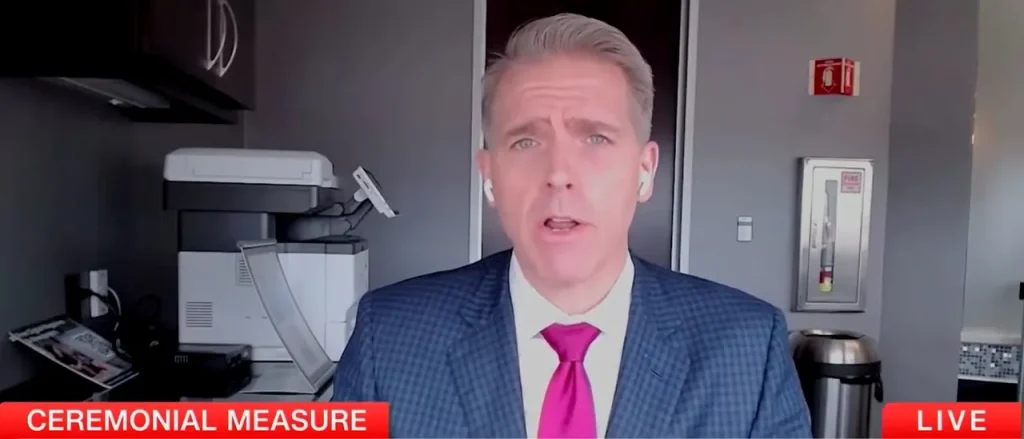Scott Jennings Has Three Words In Response To Jasmine Crockett’s Anti-Charlie Kirk Rant
On Sunday, CNN’s Scott Jennings cut through the noise and called out Representative Jasmine Crockett after her on-air attack on the late Charlie Kirk. The exchange landed hard because it came on the same day Americans were remembering a controversial but influential conservative activist. What followed was a blunt defense that Republicans will recognize as the kind of straight talk our side respects.
Crockett used her platform to cast Kirk as a toxic force, and she doubled down when pressed about a vote on a resolution related to his death. Her comments leaned on heated rhetoric and comparisons that inflamed viewers rather than calming a tense moment. For many conservatives watching, that choice felt opportunistic and irresponsible.
Jennings, who is known for terse, no-nonsense commentary, didn’t mince words. When asked how he responded to Crockett’s remarks he said, “Well, she’s lying.” That three-word dismissal was short, sharp and left no room for the soft-pedal nuance some hosts try to manufacture.
He went on to explain his perspective in fuller terms and his words deserve to be quoted exactly: “I mean, Charlie Kirk targeted nobody. He was not racist in any way. I’ve listened to hours and hours and hours and hours of Charlie Kirk debates and talks and have been with Charlie Kirk and did events with Charlie Kirk and knew Charlie Kirk. There wasn’t a racist bone in his body,” Jennings said. “To say that he was continuously targeting people of color is nothing but a malicious smear on the very day that people are remembering Charlie, and he’s going to be laid to rest.”
Jennings didn’t stop there. “And so, I think when you combine the no votes on the resolution and then you look at the leading democratic voices like Ilhan Omar and Jasmine Crockett, who’ve gone out to smear Charlie before he’s even had his funeral,” Jennings continued. “When I hear people say, we need to come together and both sides need to turn down the rhetoric, you know, a lot of the people saying that need to look inward right now. I was shocked at that. Well, I guess I should say I’m shocked by her, but I was a little, little stunned by what happened this morning.”
The substance of Jennings’s remarks is simple: public figures ought to be held to a higher standard, especially in the days after a violent, tragic loss. Conservatives hear repeated claims that rhetoric on the right must be reined in, but when similar or worse tribune-like attacks come from the left they often go unchecked. That double standard breeds anger and distrust across much of the country.
Facts matter here. Charlie Kirk was a polarizing figure, sure, but polarizing and racist are not the same thing. Hundreds of hours of speeches, debates and campus events — the record Jennings referenced — show a man who pushed conservative ideas aggressively, but not one whose public record supports the racial smear Crockett leveled on air.
There’s also a bigger media problem. CNN and similar outlets present high-stakes moments as debate theater and too often elevate the loudest lines instead of the most accurate ones. When hosts allow sweeping accusations to stand unchallenged, viewers on both sides lose faith in the institution of broadcast news.
Beyond the network drama is a political reality: the House vote that day revealed fractures on both sides of the aisle. A small group of Republicans joined Democrats to defeat a separate measure, a move that stirred criticism from conservatives who felt it signaled mixed priorities. Republicans looking to lead need to be consistent in defending principles and people who fought for conservative causes.
The Rumble clip captured part of the exchange and offers a fuller look at Jennings’s delivery and Crockett’s tone. Seeing the moment matters because soundbites only tell part of the story; the body language and cadence do the rest. For Republicans, that footage will be another data point in arguing that the left’s response to Kirk was unfair and politically motivated.
Crockett’s record shows a pattern of inflammatory remarks — from invoking extreme historical analogies to blasting political opponents in personal terms. Those statements are part of her public brand, and they tell voters something about her instincts when the cameras are on. For critics on the right, the concern is not that she’s passionate but that passion often slips into politicized attacks during sensitive moments.
If conservatives want credibility when calling out harsh rhetoric, they must be ready to point to moments like this and demand accountability. Jennings’s blunt rebuttal is a model of the kind of unapologetic defense allies expect when one of their own is attacked unfairly. It’s not about refusing debate; it’s about refusing smears presented as moral lectures.
At the end of the day this episode is another example of a broader cultural fight: who gets to define acceptable public discourse and who gets labeled beyond repair for disagreeing. Republicans will use Jennings’s words to push back on a narrative that paints their activists as inherently harmful. That fight will continue on cable, on campuses and in the halls of Congress.
For now, the immediate outcome is simple — a sharp rebuttal that landed in prime time and a conservative base that felt defended. Whether the moment leads to a larger reckoning on how media platforms handle heated accusations remains to be seen. But in an era of rapid outrage, clear-eyed, forceful responses like Jennings’s will stay central to conservative strategy.
